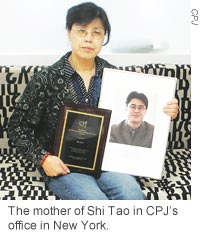New York, June 18, 2007—The mother of imprisoned Chinese journalist Shi Tao has called on the international community to maintain pressure on Chinese authorities to release her son ahead of the 2008 Olympic Games in Beijing.
“My son is not guilty. You should keep up pressure on the Chinese government to release him,” Gao Qinsheng said in a visit on Friday to the New York offices of the Committee to Protect Journalists. She said the run-up to the 2008 Olympic Games in Beijing—a time when China is concerned about its international image—presents a unique opportunity to draw attention to Shi’s unjust imprisonment.
Shi is serving a 10-year prison term for the crime of “leaking state secrets abroad.” He was jailed in 2004 for sending an e-mail describing Communist Party propaganda department orders to his newspaper Dangdai Shangbao (Contemporary Trade News). The information included orders to news editors on how to report the anniversary of the 1989 crackdown on Tiananmen Square demonstrators.
“China’s leaders should be ashamed that Shi Tao and other Chinese journalists remain in jail even as the government pledges greater media freedom in the run-up to the Olympic Games in 2008,” said CPJ Executive Director Joel Simon. “This official disparity between the treatment of foreign and domestic journalists is a chilling indication of Chinese authorities’ regard for their own citizens.”
CPJ originally invited Gao to New York in November 2005 to receive on her son’s behalf the organization’s International Press Freedom Award. Police told her at the time that Shi’s prison conditions would improve if she remained in China. Although Gao agreed not to make the trip, Shi has remained in a high-security prison where he has worked long hours cutting gems and where he has been denied adequate food and water. He suffers from skin and stomach ailments.
Gao told CPJ that she moved hundreds of miles from her home in order to be closer to the prison holding her son, but said that they cannot speak freely during their closely guarded monthly visits.
The journalist’s mother also had a critical message for Yahoo, the U.S. company that handed Shi’s e-mail account information to Chinese authorities. “You didn’t know what the police were going to do with his information, and still you gave it to them,” she said of Yahoo’s role in his detention. “You are responsible.”
Gao is in the United States to campaign for Shi’s release and to pursue a lawsuit against Yahoo for its role in the imprisonment. Yahoo has not responded to CPJ queries about its possible involvement in the imprisonment of other journalists jailed for their online activities.
In a statement to reporters last week, Yahoo said it was “dismayed that citizens in China have been imprisoned for expressing their political views on the Internet.” But the company stopped short of expressing regret over its actions in the Shi Tao case, saying that it was compelled to abide by the laws and customs of China.
Gao said that she expects to face harassment when she returns to China but is unafraid. “If I came all this way and did not express what has happened to my son, then it would be in vain,” she said. “I want people to know.”
